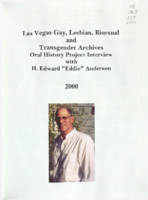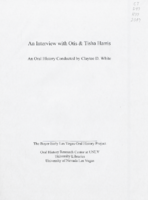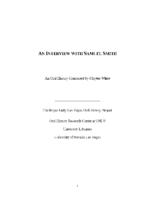Search the Special Collections and Archives Portal
Search Results

Transcript of interview with Patricia Becker by Claytee D. White, April 15, 2014
Date
Archival Collection
Description
Patty Becker’s recollections concerning her law career shows her determination and enthusiasm in encouraging women to enter the field. Beginning during a period when few women were accepted to study law, she not only passed the Nevada Bar with high marks but was chosen by Governor O’Callaghan in 1979 to become deputy attorney general. In 1985 she was chosen by Governor Richard Bryan to be the first and only woman selected to serve on Nevada’s Gaming Control Board. She also recollects arguing before the Nevada Supreme Court the case that put Tony Spilotro in the Nevada’s Black Book and working with many proficient attorneys like Oscar Goodman, Patty left the Nevada Gaming Control Board to become general counsel for Hurrah’s Entertainment where she served for nine years and then began Chief of Staff for Governor Bob Miller from 1993 through 1995. Patty also served as senior Vice President of corporate affairs and legal adviser for Aladdin Gaming as well as sitting on several corporate boards. Patty began Patricia Becker and Associates and continues to serve on the board of Fitzgerald’s Hotel and Casino, serves her own clients, as well as teaching at the University of Nevada, Las Vegas, in gaming. She encourages women to enter gaming, keep a sense of humor and not to be afraid to speak up for themselves. Meanwhile she challenges herself intellectually and believes that one should always continue to grow personally and professionally.
Text

Transcript of interview with Norman Christiansen by James Courtney, November 28, 1986
Date
Archival Collection
Description
Text

Transcript of interview with Edward "Eddie" Anderson by Dennis McBride, October 11-14, 2000
Date
Archival Collection
Description
Dennis McBride interviews Eddie Anderson (born 1946) about his role in advocating for LGBT rights, specifically his participation in the various political and social movements during previous decades. The interview begins with a discussion of Anderson’s background, including his experiences growing up in children’s homes and living with his grandparents. Anderson mentions marching with his grandparents for both workers’ and women’s rights as some of his first political involvements. Anderson also discusses his original aspirations for becoming a priest as well as his memories of meeting President John F. Kennedy during a visit to his high school when Anderson was student body president. Anderson then discusses travelling to the South, specifically in Selma, Alabama, during one summer while in high school in order to help register Black voters. Anderson then discusses his friendship with Nevada Senator Bill Raggio and his wife, and his joining of the U.S. Navy, where he met President Ri
Text

Ron Current interview, March 16, 2012: transcript
Date
Archival Collection
Description
Ron Current's heart was always in the right place, with respect to social activism and his dedication to empowering the black community in Las Vegas. Inspired by Black Panther Party founders, Huey P. Newton and Bobby Seale, Ron started the Black Panther Party Las Vegas Chapter. He was also the director of public relations for the National Alliance Against Racist and Political Repression; an organization created to work in tandem with the National Association for the Advancement of Colored People, NAACP, to eliminate racial inequality. Ron describes the overall atmosphere of the Westside community in Las Vegas during the early days, as chaotic, drug infested, and riddled with daily gang related shootings. He also recalls the historic preservation attempts made by leading members of the Westside community, such as Sarann Knight Preddy. Ron recalls working at the University Medical Center while recruiting for the Black Panther Party Las Vegas Chapter. This interview demonstrates the power of love. As the founder and leader of the Black Panther Party Las Vegas Chapter, Ron was named one of the most influential blacks in Las Vegas by the Sentinel Voice. He recalls utilizing his hands-on leadership approach towards capacity building and the successful implementation of community mobilization strategies and methods. He was a champion for educational equity, equal access to employment opportunities, and economic equality in Las Vegas, Nevada.
Text

Transcript of interview with Robert & Patricia Campbell by Stefani Evans, November 28, 2017 & March 1, 2018
Date
Archival Collection
Description
In 1976, when Bob Campbell accepted the city manager position in Henderson, Nevada, he and his family had just endured nearly a month of sub-zero temperatures in their native Missouri. Southern Nevada's mild winter coupled with the promise of developing the 8,600 acres that would become Green Valley convinced Bob and his wife, Pat, to make the move. Bob came to Henderson with a degree in public administration and city manager experience in two Missouri towns, but Green Valley offered something akin to "an artist having a blank canvas on which to plan and create." In this interview, Bob talks about the ways his career in public administration blossomed in Southern Nevada. After about five years with the City of Henderson, Campbell joined Mark Fine and American Nevada Corporation to develop Green Valley; five years after that, he moved to Southwest Gas Corporation to work with Bill Laub and later, Kenny Guinn. From about 1989 to 1997, he helped develop Lake Las Vegas. In 1994, Bob and Pat together formed The Campbell Company, a private consulting firm whose clients included Transcontinental Properties' Lake Las Vegas project as well as Henry Chen's Ascaya. v Much of the interview focuses on the Lake Las Vegas project: its original visionary, false starts, and its tumultuous development as an arm of the Bass brothers of Fort Worth, Texas; their developer, Ronald Boeddeker of Transcontinental Properties in Santa Barbara, California, and Boeddeker's appointee, Alton Jones. Along the way Campbell shares the strategies employed by the Wednesday morning group of Henderson boosters who met at Saint Peter's Catholic Church and who succeeded in gaining the necessary local, state, and federal approvals to move the project forward. He reveals the intimidation, physical threats, and sexual harassment suffered by those who questioned the way Jones did business. Overall, though, he explains why he continues to respect the Bass brothers and is still proud of Lake Las Vegas, "proud that we got it on, and proud that it's turned out to be what it is."
Text

Transcript of interview with Florence McClure by Joanne Goodwin, January 24, 1996 & February 6, 1996
Date
Archival Collection
Description
Florence McClure came to Las Vegas later in her life, but the state felt her presence and the community her contributions as if she were a native daughter. Introduced to the League of Women Voters in 1967, McClure met her political mentor Jean Ford and learned how to practice the core elements of democracy. She put those tools to work in a number of ways, however her participation in the creation of the Rape Crises Center and her advocacy for locating the women’s prison near Las Vegas are two of her long-lasting efforts. Florence Alberta Schilling was born in southern Illinois where she enjoyed the security of a tight-knit family and the independence to test her abilities growing up. She graduated from high school and attended the MacMurray College for Women at Jacksonville. With the attack on Pearl Harbor in 1941, she began a series of jobs working for the war effort. She moved to Ypsilanti, Michigan with a girlfriend to work at the Willow Run Army Airbase and then moved to Miami, Florida where she worked for the Provost Marshall in the Security and Intelligence Division. She met her husband, James McClure, at the time and they married in 1945. During the next several years, they raised a family and moved around the country and to Japan with the military. McClure came to Las Vegas in 1966 as part of her work in the hotel industry which she engaged in after her husband’s retirement from the military. She had worked in California and Miami Beach, but it was Burton Cohen in Los Angeles who invited her to join him in a move to Las Vegas to build the new Frontier Hotel and Casino. Following the completion of the Frontier, she moved to the Desert Inn with Cohen in 1967 and worked as the executive office manager. After a few years, she decided to leave the industry and complete her college education. She graduated from UNLV in 1971with a BA in Sociology with an emphasis on criminology. She was 50 years old. McClure had been a member of the League of Women Voters for a few years at that point and had learned the political process from Jean Ford and workshops on lobbying. She had numerous skills that were waiting to be tapped when she attended an informational meeting on the incidence of rape in the Las Vegas valley. From that meeting, a small group of individuals, including McClure, began the organization Community Action Against Rape (later renamed the Rape Crisis Center) in 1973. It was the first agency in the area devoted to serving individuals who had been assaulted and changing the laws on rape. The organization’s first office was set up in McClure’s home. Over the next decade, she worked to change attitudes and reshape policy by constantly raising the issues of sexual assault with police officers, emergency room doctors, judges, and legislators. Her role as an advocate took her into hospital emergency rooms and courtrooms to assist victims. It also took her to the state legislator to lobby repeatedly for a change in laws. During this period, journalist Jan Seagrave gave McClure the nickname “Hurricane Florence” - a fitting moniker that captured the force with which McClure attacked the issue. As a result of her efforts and those of the people with whom she worked, we now 1) recognize rape as a crime of assault; 2) forbid the sexual history of a rape victim from being used against her in court; and 3) recognize marital rape. In addition to learning about Florence McClure’s activities, the reader of this interview will gain information on the role of civic organizations like the League of Women Voters in engaging the voluntary efforts of women in the post-war years.
Text

Transcript of Interview with Otis & Tisha Harris, September 15, 2010
Date
Archival Collection
Description
Otis and Tisha Harris detail the businesses that existed in West Las Vegas.
Text

Transcript of interview in two sessions with Samuel Smith conducted by Claytee White, June 17, 2011, and June 22, 2011
Date
Archival Collection
Description
Transcript from interviews with Samuel Smith by Claytee White, June 17, 2011, and June 22, 2011. Smith was a police officer in New York and moved to Las Vegas in 1978, where he became a fire inspector with the Las Vegas Fire Department. In this interview he discusses issues facing the Westside including racism, business development and education.
Text

Transcript of interview with Trish Geran by Claytee D. White, April 14, 2015
Date
Archival Collection
Description
Trish Geran is too busy to pigeonhole herself into one role. The activist, author, daughter, engineer, filmmaker, public speaker, and student was born and raised in Las Vegas’s Westside community as the fifth and youngest child of Hazel and Johnus Geran. She and her sister attended Catholic elementary school and Bishop Gorman High School, and her brothers went to Madison Elementary School, Roy W. Martin Junior High School, and Las Vegas High School. In this interview Trish discusses the feelings of not belonging that shaped her world view: she was different from her white, wealthy schoolmates, and as a private school student she was different from her neighbors. She found balance through excelling in sports, drill team, and academics. After graduating from the University of Nevada, Las Vegas (UNLV) and cashing in an IRA to work on Barak Obama’s presidential campaign, Trish found out from her mother that the City of Las Vegas was going to close F Street, main link between the Westside
Text

Transcript of interview with Renee Diamond by Caryll Batt Dziedziak, November 1997
Date
Archival Collection
Description
Text
